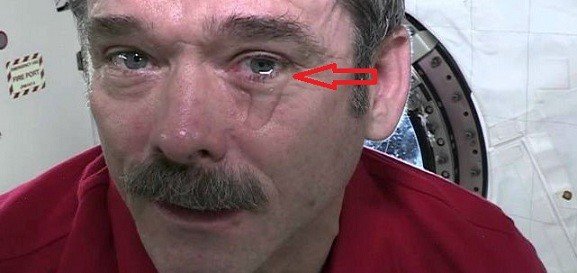Space Travel Could Leave Astronauts Partially Blind. Here's The Reason
I will be taking us through some of the experiences by astronauts in astro-travel. You may have had an idea of this; but if not, I'd be willing to let you know that astronauts could develop partial blindness or visual impairment when they spend a longer period in space (over two-third has been confirmed to suffer from this impairment).

Scientists have been awed as to why this happens. The answer is not far-fetched again. Thanks to research team from university of Miami. From the research made, it was uncovered that astronauts who spend an upward of 6months in space have a higher percentage volume of cerebrospinal fluid compared to astronauts who spend less.
To be very precise, cerebrospinal fluid is a good thing. At least, it helps shield the spinal cord and the brain. It also nourishes the nervous system tissue, and also removes waste matter from the brain.
However, "too much of everything is not particularly good"
This is what the leader of the research team; Professor Naom Alperin (department of biomedical engineering and radiology) has to say:
Cerebrospinal fluid which adjusts normally to changes in pressure of the earth gets disbanded by the minimized gravity in space, and as such, it builds up around the eye socket. Prof Naom Alperin [paraphrased by me]

While this happens, the effect of this fluid around the eye socket thins out the back of the eyeballs of the astronauts
The effects of this thinning out include:
- Change in shape and size of the retina
- Inflammation in the optic nerve
- Causes the eyeball to wrinkle
This condition is called "Visual Impairment Intracranial Pressure Syndrome"
There are some real cases of this. I'll just drop the major ones: In the year 2005, NASA astronaut John Phillips, spent over 6months in space. He picked up this syndrome. His vision degenerated from "20-20" to "20-100". Another major case is Robert Thirsk in 2009. Also Scott Kelly in 2015 (spent over a year in International Space Station; ISS). Their vision never recovered fully. Scott had to pick up eye glasses as an aid.
Now, if space travel could cause this kind of problem, then the proposed Mission-to-Mars crew would be heavily bothered. Because they'll spend over a year in the travel.
I just hope they won't return completely blind. But if they do, how will they navigate their way back to earth? (humorous though).
In my opinion, scientists should figure out the solution to this before the Mission-to-Mars. Because, the possibility of astronauts picking this trip at the expense of their eyes is not feasible. But in any case, astronauts should just brace up for impact.
Thanks for reading
References for further reading: Ref1, Ref2, Ref3


I'm really honored sir. Go SteemSTEM!!
Space trip is great but comes with it's odds.
Do you know that Astronaut's shoulders gets broader on return from a space trip.?
And They get taller too. Because of the minimal gravity, their spines tend to stretch out
WOW! Never heard about this...thanks for the write-up. I will be following your posts.
Thanks a lot
Well done @samminator
Thanks a lot
Do u make space trips?
I've always fantasized about space trips
I very like your post,your post is very nice
Thanks